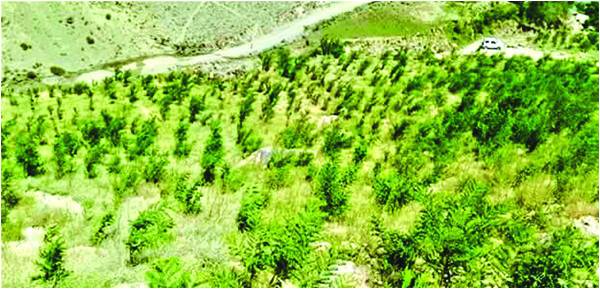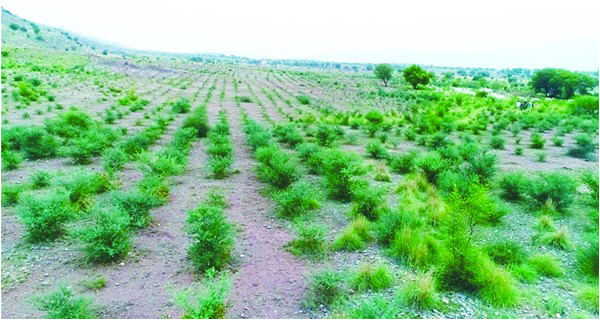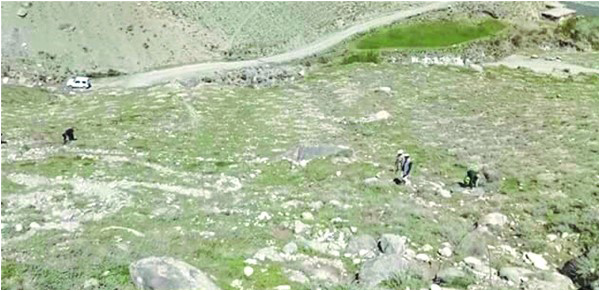
“It was a moment hard to forget, when I presented the Billion Trees Tsunami Afforestation Project at COP21 in Paris,” says Malik Amin Aslam, who heads Khyber Pakhtunkhwa’s Green Growth Initiative.
Aslam was invited to present the Billion Trees project (BTTAP) at the Global Forest Leaders seminar in Paris to talk about how they had improved the forest cover, created green jobs, built resilience to climate change and sought benefits from Reducing Emissions from Deforestation and Forest Degradation (REDD+). After the presentation, the director-general of the IUCN, Inger Anderson, lauded the afforestation initiative and encouragingly remarked that, “We need a Billion Trees Tsunami for the World,” according to Aslam.
The project is also registered under the Bonn Challenge, an initiative to restore 150 million hectares of deforested and degraded land by 2020 and 350 million hectares by 2030. BTTAP has successfully reached the milestone of planting one billion trees in Khyber Pakhtunkhwa, the equivalent to restoring 350,000 hectares (ha) of forests and degraded land. The project has become the first entity from among 45 countries and provinces to surpass its globally committed target, and has already contributed to forest restoration of more than 600,000 ha by now.
Last week, Khyber Pakhtunkhwa’s green charter was adopted by the ruling Pakistan Tehreek-e-Insf in a convention on November 14, through which the political party and its followers said they would strive to promote clean air and water, promote sustainable development and conservation and the creation of green jobs etc.
It was important to initiate a massive afforestation drive in Khyber Pakhtunkhwa, as according to the Provincial Forest Resource Inventory Report 1996 by GIZ, 78% of its forests were degraded, and 74% was degrading without natural regeneration.
Through the project, 100 million Eucalyptus trees have been planted, most of them on communal lands in waterlogged areas to incentivize the project for private landowners. Though a fast-growing species, the Eucalyptus contributes to reducing salinity and water logging.
World Wide Fund for Nature-Pakistan (WWF-Pakistan), a conservation organization, had monitored the plantations and given the average survival rate of 86% for the species. Dr. Masood Arshad, who is the director for Climate, Energy & Freshwater at WWF-Pakistan, endorsed the project and said that the BTTAP team did a comprehensive study to assess the best plantation techniques, such as direct planting, sowing, assisted natural regeneration and farm forestry before they went to work.
According to BTTAP officials, they have engaged religious scholars and clerics or ulema to further the cause of conservation and urge communities to give their land for the massive afforestation drive.
According to KP’s Chief Conservator Forests, Siddiq Khattak, BTTAP will take care of the plantations for three years, after which the owners of the land will themselves take care of it to support their growth. “The initiative has focused on the growth of indigenous species that are supportive of the local ecosystem,” he said. In Muslimabad area of Kohat, for example, 43,500 plants have been planted, which includes 85% Polai, two percent Sanata, 3.1 percent Shisham, one percent Keekar and 9.3 percent Eucalyptus. Lachee Khan, a landowner from Kohat, said that he had himself requested for the Eucalyptus through the project, as it suited his needs.

BTTAP has added more than 350,000 hectares (ha) to KP’s forests, increasing the forest cover in the province from 20% to 25% in four years since 2013. This works on the national Millennium Development and Sustainable Development Goals to increase the national forest cover. These plantations are being transparently monitored through GIS mapping to not only credibly check progress but also guard against illegal logging, added Malik Amin Aslam.
At another site, Wanda Sher Dil in Dera Ismail Khan, almost 162,250 Tamarix, Eucalyptus and Keekar were planted on 150 ha, in a bid to stem waterlogging. This area is counted as a floodplain zone and it is hoped that the plantations will control flooding and reduce soil erosion at large.
Muhammad Hanif, a landowner living in Rodha, Dera Ismail Khan, who had dedicated 1,000 kanals for the project, hoped that it will yield environmental as well as economic benefits. “If the land is fenced, it can create a conducive environment for wildlife species such as partridge and hog deer,” he said.

Herders
The massive afforestation drive is rumored to be affecting traditional nomads, locally known as ‘bakarwals’, as their migratory routes have changed due to the initiative. Sixty-year-old Muhammad Hanif Perwana is one of them. His ancestors have been taking their livestock to graze on the Deosai plateau in the summers and in the winters they come to Punjab to live on the Potohar plateau near Jhelum, Chakwal, Attock and Rawalpindi. “The bakarwals had been stopped from using the routes on which BTTAP plantations are carried out,” he said. “Though the route has been used by herders since ancient times, the KP government has imposed Section 144 in the area especially on the route between Naran Kaghan to Haripur. If any of the nomads bring their livestock on this route, they are arrested.”
With traditional migratory routes being affected, these people are left with no choice but to load their livestock on trucks to cover this path. “During this transportation, a significant number of livestock die,” added Hanif. He said that the KP government should at least allow the nomads to use the route as part of their rights as indigenous people. For his part, Malik Amin Aslam said that the BTTAP authorities would look into a “safe” corridor for indigenous herders, which did not harm the young plantations.
Plant choice
Another criticism of the BTTAP has been in its choice of plants. Inspector General of Forests Syed Mahmood Nasir was of the view that BTTAP’s team should avoid planting alien species and plant trees only where they grow naturally without human assistance. Human assistance means watering, weeding and spraying pesticides etc. Planting trees inside natural zones will reduce costs tremendously.
“Planting trees outside their natural zones can lead to plantations on particular traditional pastures, which may even violate the rights of indigenous communities, especially the long distance mobile indigenous people, who have traditional migratory routes,” cautioned Nasir.
Transparency
The project has also received criticism from some government factions as well, who say that only 400 million plants were planted and the remaining 600 million had been grown through natural regeneration. However, Assisted Natural Regeneration (ANR) is endorsed by the Food and Agriculture Organization of the United Nations as one of the cheapest techniques to improve forest cover and restore biodiversity with additional benefits such as generating community green jobs and rapid carbon sequestration.
“BTTAP has always gone for ANR as the main focus,” said project head Aslam. “This unique technique backed by organized community participation is now being seen as a global success story and a model for other international projects to learn from.”
WWF-Pakistan has also endorsed that in KP’s dwindling forests, natural regeneration has almost doubled in three years. Also due to this focus on natural regeneration, the cost of the project has been significantly reduced from Rs22 billion (original plan) to around Rs12 billion.
WWF-Pakistan’s Dr. Masood Arshad said that after monitoring the project they came to the conclusion that natural regeneration was cost effective, socially and ecologically viable and created long-term partnerships with community organizations. “The approach has successfully contributed towards enhancing the productivity of the ecosystem, biodiversity conservation, regulation of watersheds and prevention of soil erosion.”
According to IUCN’s Inger Anderson the project has established 13,000 private tree nurseries, which have boosted local incomes, generated thousands of green jobs, and empowered unemployed youth and women. Terming BTTAP as one of the largest eco-investments ever made in Pakistan, she hoped that the project will contribute towards economic uplift of the province.
The federal government made a national pledge to the Bonn Challenge in May 2017 to complement the existing KP commitment, pledging 100,000 ha at the first Asia Bonn Challenge Roundtable in South Sumatra, thus helping the Bonn Challenge cross the 150 million ha milestone.
BTTAP pledges to increase forest cover upto 0.35 million ha by 2020 which will yield $121 million worth of economic benefits and carbon sequestration of 0.04 gt carbon dioxide.
Syed Muhammad Abubakar writes on climate change, deforestation, food security @SyedMAbubakar
Aslam was invited to present the Billion Trees project (BTTAP) at the Global Forest Leaders seminar in Paris to talk about how they had improved the forest cover, created green jobs, built resilience to climate change and sought benefits from Reducing Emissions from Deforestation and Forest Degradation (REDD+). After the presentation, the director-general of the IUCN, Inger Anderson, lauded the afforestation initiative and encouragingly remarked that, “We need a Billion Trees Tsunami for the World,” according to Aslam.
The project is also registered under the Bonn Challenge, an initiative to restore 150 million hectares of deforested and degraded land by 2020 and 350 million hectares by 2030. BTTAP has successfully reached the milestone of planting one billion trees in Khyber Pakhtunkhwa, the equivalent to restoring 350,000 hectares (ha) of forests and degraded land. The project has become the first entity from among 45 countries and provinces to surpass its globally committed target, and has already contributed to forest restoration of more than 600,000 ha by now.
WWF-Pakistan has also endorsed that in KP's dwindling forests, natural regeneration has almost doubled in three years. Also due to this focus on natural regeneration, the cost of the project has been significantly reduced from Rs22 billion (original plan) to around Rs12 billion
Last week, Khyber Pakhtunkhwa’s green charter was adopted by the ruling Pakistan Tehreek-e-Insf in a convention on November 14, through which the political party and its followers said they would strive to promote clean air and water, promote sustainable development and conservation and the creation of green jobs etc.
It was important to initiate a massive afforestation drive in Khyber Pakhtunkhwa, as according to the Provincial Forest Resource Inventory Report 1996 by GIZ, 78% of its forests were degraded, and 74% was degrading without natural regeneration.
Through the project, 100 million Eucalyptus trees have been planted, most of them on communal lands in waterlogged areas to incentivize the project for private landowners. Though a fast-growing species, the Eucalyptus contributes to reducing salinity and water logging.
World Wide Fund for Nature-Pakistan (WWF-Pakistan), a conservation organization, had monitored the plantations and given the average survival rate of 86% for the species. Dr. Masood Arshad, who is the director for Climate, Energy & Freshwater at WWF-Pakistan, endorsed the project and said that the BTTAP team did a comprehensive study to assess the best plantation techniques, such as direct planting, sowing, assisted natural regeneration and farm forestry before they went to work.
According to BTTAP officials, they have engaged religious scholars and clerics or ulema to further the cause of conservation and urge communities to give their land for the massive afforestation drive.
According to KP’s Chief Conservator Forests, Siddiq Khattak, BTTAP will take care of the plantations for three years, after which the owners of the land will themselves take care of it to support their growth. “The initiative has focused on the growth of indigenous species that are supportive of the local ecosystem,” he said. In Muslimabad area of Kohat, for example, 43,500 plants have been planted, which includes 85% Polai, two percent Sanata, 3.1 percent Shisham, one percent Keekar and 9.3 percent Eucalyptus. Lachee Khan, a landowner from Kohat, said that he had himself requested for the Eucalyptus through the project, as it suited his needs.

BTTAP has added more than 350,000 hectares (ha) to KP’s forests, increasing the forest cover in the province from 20% to 25% in four years since 2013. This works on the national Millennium Development and Sustainable Development Goals to increase the national forest cover. These plantations are being transparently monitored through GIS mapping to not only credibly check progress but also guard against illegal logging, added Malik Amin Aslam.
At another site, Wanda Sher Dil in Dera Ismail Khan, almost 162,250 Tamarix, Eucalyptus and Keekar were planted on 150 ha, in a bid to stem waterlogging. This area is counted as a floodplain zone and it is hoped that the plantations will control flooding and reduce soil erosion at large.
Muhammad Hanif, a landowner living in Rodha, Dera Ismail Khan, who had dedicated 1,000 kanals for the project, hoped that it will yield environmental as well as economic benefits. “If the land is fenced, it can create a conducive environment for wildlife species such as partridge and hog deer,” he said.

Herders
The massive afforestation drive is rumored to be affecting traditional nomads, locally known as ‘bakarwals’, as their migratory routes have changed due to the initiative. Sixty-year-old Muhammad Hanif Perwana is one of them. His ancestors have been taking their livestock to graze on the Deosai plateau in the summers and in the winters they come to Punjab to live on the Potohar plateau near Jhelum, Chakwal, Attock and Rawalpindi. “The bakarwals had been stopped from using the routes on which BTTAP plantations are carried out,” he said. “Though the route has been used by herders since ancient times, the KP government has imposed Section 144 in the area especially on the route between Naran Kaghan to Haripur. If any of the nomads bring their livestock on this route, they are arrested.”
With traditional migratory routes being affected, these people are left with no choice but to load their livestock on trucks to cover this path. “During this transportation, a significant number of livestock die,” added Hanif. He said that the KP government should at least allow the nomads to use the route as part of their rights as indigenous people. For his part, Malik Amin Aslam said that the BTTAP authorities would look into a “safe” corridor for indigenous herders, which did not harm the young plantations.
Plant choice
Another criticism of the BTTAP has been in its choice of plants. Inspector General of Forests Syed Mahmood Nasir was of the view that BTTAP’s team should avoid planting alien species and plant trees only where they grow naturally without human assistance. Human assistance means watering, weeding and spraying pesticides etc. Planting trees inside natural zones will reduce costs tremendously.
“Planting trees outside their natural zones can lead to plantations on particular traditional pastures, which may even violate the rights of indigenous communities, especially the long distance mobile indigenous people, who have traditional migratory routes,” cautioned Nasir.
The massive afforestation drive is rumored to be affecting traditional nomads, locally known as 'bakarwals', as their migratory routes have changed due to the initiative
Transparency
The project has also received criticism from some government factions as well, who say that only 400 million plants were planted and the remaining 600 million had been grown through natural regeneration. However, Assisted Natural Regeneration (ANR) is endorsed by the Food and Agriculture Organization of the United Nations as one of the cheapest techniques to improve forest cover and restore biodiversity with additional benefits such as generating community green jobs and rapid carbon sequestration.
“BTTAP has always gone for ANR as the main focus,” said project head Aslam. “This unique technique backed by organized community participation is now being seen as a global success story and a model for other international projects to learn from.”
WWF-Pakistan has also endorsed that in KP’s dwindling forests, natural regeneration has almost doubled in three years. Also due to this focus on natural regeneration, the cost of the project has been significantly reduced from Rs22 billion (original plan) to around Rs12 billion.
WWF-Pakistan’s Dr. Masood Arshad said that after monitoring the project they came to the conclusion that natural regeneration was cost effective, socially and ecologically viable and created long-term partnerships with community organizations. “The approach has successfully contributed towards enhancing the productivity of the ecosystem, biodiversity conservation, regulation of watersheds and prevention of soil erosion.”
According to IUCN’s Inger Anderson the project has established 13,000 private tree nurseries, which have boosted local incomes, generated thousands of green jobs, and empowered unemployed youth and women. Terming BTTAP as one of the largest eco-investments ever made in Pakistan, she hoped that the project will contribute towards economic uplift of the province.
The federal government made a national pledge to the Bonn Challenge in May 2017 to complement the existing KP commitment, pledging 100,000 ha at the first Asia Bonn Challenge Roundtable in South Sumatra, thus helping the Bonn Challenge cross the 150 million ha milestone.
BTTAP pledges to increase forest cover upto 0.35 million ha by 2020 which will yield $121 million worth of economic benefits and carbon sequestration of 0.04 gt carbon dioxide.
Syed Muhammad Abubakar writes on climate change, deforestation, food security @SyedMAbubakar

